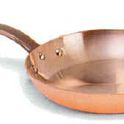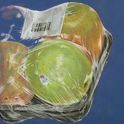Salmon and salmon
I'm thinking of roasting some salmon for a dinner next week. For fewer guests, I'd use wild Alaskan/Pacific (e.g., King) but for 6 people...well, ka-ching! The local fish shop also has salmon from Ireland, labelled as organic/sustainably farmed. More costly than Atlantic farmed (which I don't want to use), but significantly less than King. So, question: has anyone had this Irish salmon? Understanding wild Alaskan would be better, but is this one still tasty?
36 Comments
Put a sauce with it. Local natives here do salmon with blueberries - it goes nice with a light merlot (yes, a red).
I also like to bake it with a tapanade coating with chopped sun dried tomatoes (stole that recipe from the Royal Vancouver Yacht Club), or even with a pesto coating and a sharp pinot gris.
You could also make your own candied salmon to serve as a canape'. Just slather it with some honey/maple syrup (lightly) and put in a slow oven.
http://www.npr.org/blogs...
pierino - quirky Russ & Daughters-related factoid: when I was a kid, Zero Mostel did some work for my father - his contract stipulated precise on-set catering from R&D...ONLY. One bite and he'd know if it came from anywhere else, and all work would cease until the insult was corrected - as a harried assistant learned the hard way.
My question wasn't based on ignorance of that issue; I simply had seen this Irish organic salmon - which I was told was farmed in a sustainable way, unlike the Atlantic farmed salmon I usually see at fish counters. Was curious about that specific one - veracity, taste, etc. That's all. (Not sure how this translated into needing to be schooled on the entire subject. Wow.)
Regardless, farmed seafood and sustainability would be a good subject for a feature here perhaps...
Nancy
Secondly, you must understand that Atlantic salmon (Salmo salar) is a very different fish from Pacific salmon (Oncorhyncus--hope I've spelled that correctly) and it has nothing to do with farming or not. Atlantic salmon are by nature a fattier fish (good Omega-3 fats) and those of us who grew up on it prefer it to the leaner, dryer texture of Pacific salmon, delicious as it may be. The organic Irish salmon you saw is a very good choice, in my experience. Another good choice, mentioned here, is Loch Duart, a Scottish salmon. In both cases, these fish are raised in as sustainable a manner as possible--probably far more sustainably than the chicken most of us buy. There are three questions constantly raised about farmed salmon:
1) It is fed antibiotics; most fish are not fed antibiotics because their disease threats are viruses and antibiotics won't work; in any case, the huge (and I mean HUGE!!!) percentage of antibiotics used in the U.S. are to promote growth in livestock, so if you're against antibiotics, you should give up all meat but what is certifiably safe;
2) The feed--what is referred to as the fish in/fish out ratio, or it takes more than a pound of fish to create a pound of salmon. This is indeed a problem that conscientious salmon farmers are working hard to correct. From a ratio of 4 : 1 they are now down closer to 1 : 1 (not all, but the best are). I expect we will see it below 1 : 1 in the years ahead.
3) Salmon cages pollute the bays and inlets in which they are sited. Pollution is an alarming word, but fish poop in the water often creates a biologically rich area beneath the cages, as many fishermen of other species have told me. Furthermore, there are all kinds of controls over "pollution" from the fish food itself--obviously it's not in the interest of farmers to lose a lot of feed into the water.
I count myself a strong environmentalist and I think fish farming, when done correctly, is the only way we have to preserve the ocean's bounty--while continuing to eat healthful, delicious fish. And that most definitely includes Atlantic salmon.
If it's the quality of the product and its impact on the world, well, people disagree. Monterey Bay Aquarium's Seafood Watch program continues to suggest that we avoid all farmed salmon. Many Europeans (and even some Berkeley, California fishmongers) disagree. I wish people ate more seafood, so it pains me that the choices are so complicated. Perhaps the editors of FOOD52 would think about publishing a salmon primer to lay out the issues and try to make the choices more straightforward.
Loch Duart, by the way, is Scottish, not Irish. Among the reputable fish merchants I can walk to, some are pro and some are con.
Even though salmon at the market has to be labeled "color added" you easily distinguish wild salmon from farm raised just by looking at it. Natural salmon has a much richer color. You would have to be color blind not to be able to tell them apart.
There are some great examples of successful, delicious aquaculture (usually fresh water) but salmon isn't one of them.
But this is sustainably farmed Irish salmon. Typically I try to avoid farmed, but Mr. Fish Guy claims this is good, and farmed responsibly...maybe I should buy a small piece to cook up and taste test!








